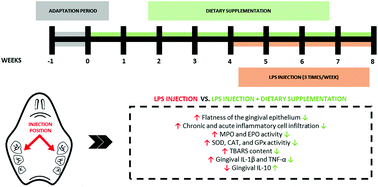Impact of citrus flavonoid supplementation on inflammation in lipopolysaccharide-induced periodontal disease in mice
Abstract
In general, the consumption of flavonoid-rich foods may influence the control/dysregulation of the magnitude and duration of inflammation and oxidative stress, which are known to contribute to multiple pathologies. Information regarding the impact of citrus flavonoid dietary supplementation on periodontal disease is still scarce. Herein, we investigated whether a diet supplemented with eriocitrin and eriodictyol could alter the course of the inflammatory response associated with LPS-induced periodontal disease in mice. Sixty BALB/c mice received a standard diet or a diet supplemented with different concentrations of eriocitrin or eriodictyol. After 30 days of food supplementation, a solution containing LPS from Escherichia coli was injected into the gingival tissues three times per week for four weeks. Neutrophils, mononuclear cells and eosinophils were assessed using a severity analysis system in H&E-stained sections and modified picrosirius red. The activities of myeloperoxidase (MPO), a marker of granulocyte infiltration, and eosinophil peroxidase (EPO) were determined spectrophotometrically. The oxidative damage was determined by measuring the malondialdehyde (MDA) content and anti-oxidative activity through the assessment of superoxide dismutase (SOD), catalase (CAT), and glutathione peroxidase (GPx). Interleukin (IL)-1β, TNF-α, and IL-10 were quantified by multiplex immunoassay. Periodontal inflammation was significantly inhibited by citrus flavonoid supplementation, including reduced flatness of the gingival epithelium and chronic and acute inflammatory cell infiltration, as well as loss of connective tissue in the gingival papillae. Both eriocitrin and eriodictyol inhibited gingival IL-1β and TNF-α and increased IL-10 secondary to periodontitis. Significant protection and decreased MPO and EPO activity were detected in the periodontal tissue of citrus flavonoid-treated animals. In comparison with the LPS group, SOD, CAT and GPx activities were increased, while the MDA content was reduced, indicating decreased oxidative damage. These results suggest that a diet supplemented with the citrus flavonoids eriocitrin or eriodictyol may aid in the prevention of periodontitis, representing a potential method to enhance local immunity and host defense.



 Please wait while we load your content...
Please wait while we load your content...